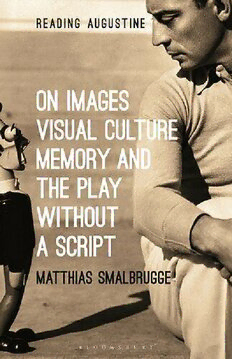
On Images, Visual Culture, Memory and the Play without a Script PDF
185 Pages·2022·1.351 MB·English
Most books are stored in the elastic cloud where traffic is expensive. For this reason, we have a limit on daily download.
Preview On Images, Visual Culture, Memory and the Play without a Script
Description:
Matthias Smalbrugge compares modern images to plays without a script: while they appear to refer to a deeper identity or reality, it is ultimately the image itself that truly matters. He argues that our modern society of images is the product of a destructive tendency in the Christian notion of the image in general, and Augustine of Hippo’s in particular. This insight enables him to decode our current ‘scripts’ of image.As we live in an increasingly visual culture, we are constantly confronted with images that seem to exist without a deeper identity or reality – but did this referential character really get lost over time? Smalbrugge first explores the roots of the modern image by analysing imagery, what it represents, and its moral state within the framework of Platonic philosophy. He then moves to the Augustinian heritage, in particular the Soliloquies, the Confessions and the Trinity, where he finds valuable insights into images and memory. He explores within the trinitarian framework the crossroads of a theology of grace and a theology based on Neoplatonic views. Smalbrugge ultimately answers two questions: what happened to the referential character of the image, and can it be recovered?
See more
The list of books you might like
Most books are stored in the elastic cloud where traffic is expensive. For this reason, we have a limit on daily download.
